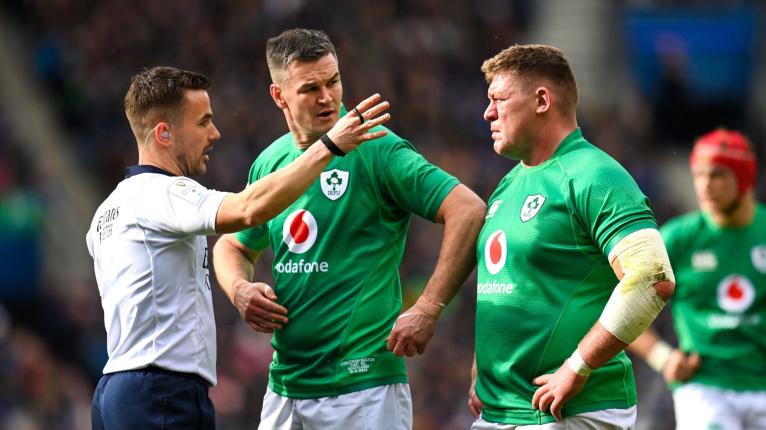Ref Watch: Sometimes less is more in rugby

I really like Luke Pearce’s approach to refereeing and will not be at all surprised if he survives the midway cut and takes charge of a quarter-final in this year’s World Cup.
In fact, given his relative youth and the likely retirements of Wayne Barnes and Jaco Peyper following France 2023, Pearce must stand a chance of taking charge of the 2027 final if his maintains his upward trajectory.
When less is more
Pearce’s real strength is the clarity of thought and simplicity with which he conveys this information to the players. It is very easy to understand what he wants and no-one is in any doubt about where his lines are drawn.
As mentioned in yesterday’s column, Pearce like Ben O’Keeffe is bilingual in English and French which will also help his career progress on the international stage.
I am sure many who watched all three matches this weekend will like me have been instantly struck by the contrast between Pearce’s approach and that of Damon Murphy during the Italy v Wales match.
Murphy filled every available space with well-intentioned but largely unnecessary chatter and as a result struggled to get his message across to players (especially the Italy skipper) who had long since tuned out his ‘white noise.’
Twenty-four hours later I actually wondered if the ref mike was broken after about eight minutes before the kerfuffle around the ‘try that wasn’t’ following Scotland’s quickly-taken lineout brought Pearce’s voice to the TV microphones for the first time.
By minimising verbal input and choosing language carefully a referee has significantly more impact since experienced players intuitively realise that when he speaks they need to listen. This is always a difficult lesson for younger referees to learn, and while Murphy is not in this category I felt nerves got the better of him in Rome.
Captaincy Contrast
I especially enjoyed Pearce twice marching Scotland back ten metres following dissent – an old-school approach which we too rarely see employed in the modern age.
This also really highlighted the difference in experience levels of the two captains.
Jamie Ritchie had to be told by Pearce at one point not to get in his face. This suggests Scotland’s captain was struggling to contain his emotions and to build a rapport with the man in charge.
I have on occasions (perhaps unfairly) bracketed Johnny Sexton with Owen Farrell and Dan Biggar as a captain whose default mode is too confrontational for his team to get the best outcome from the officials.

But this season – maybe because his Irish team are so good – he seems a lot more relaxed and reasonable in how and when he speaks to the referee, choosing his moment to place the odd suggestion in the match official’s mind in a conversational manner.
It was very telling late in the game that when Ritchie approached Pearce in a less agitated way he got the response: “Fair enough Jamie” – let’s hope he learns from this.
Many misunderstand the role of the captain when it comes to working with the referee. A skipper who repeatedly challenges decision-making, doesn’t speak to the official as an equal and has the aim of wearing him down until he caves in to sidestep conflict, will rarely make much progress with a more experienced referee.

By contrast, those who choose their moment to politely plant a seed generally achieve more. For example, “Would you mind having a look at the back foot offside line please ref?” or “My front row are worried about their hooker driving down, could you please take a look?” will usually get the official to at least consider whether he is missing something.
Another similar situation arose late in the first half when Ireland prop Andrew Porter told Pearce that he should yellow card Stuart Hogg after the Scotland full back slowed Ireland’s breakdown ball when deep in defence.
Instead, after awarding a penalty to Ireland, Pearce called Sexton across to warn him: “Be careful Johnny – this player asking for a yellow card might go as well.”
In commentary Nigel Owens speculated whether Hogg was rescued by the ‘rebound effect’ of Porter’s intervention. While I can’t answer for Pearce, I can state with total confidence that I would not have carded a player after everyone on the field had heard this input from one of his opponents!
Ireland’s hooker crisis
It is relatively unusual for a side to lose two players in the same position to injury in not much more than 40 minutes, but this was the issue faced by Andy Farrell’s side following the departures of Dan Sheehan and Ronan Kelleher.
The excellent Andrew Cotter immediately picked up on the possibility of the match being completed with uncontested scrums. We then all waited with baited breath for the next set scrum which eventually was fully contested thanks to Ireland’s replacement loose head Cian Healy being in the middle of their front row.
Cometh the hour… ? #SixNations2023 pic.twitter.com/DHhs90eOGl
— RugbyPass (@RugbyPass) March 12, 2023
Of seven second-half scrums, the four penalties awarded were shared while Josh van der Flier proved an adequate lineout thrower, so it is fair to say that Ireland proved as adaptable as they are capable.
It was interesting to hear Owens explain that in an international match, where both sides are allowed a full set of three front row replacements, if one of them is also able to play in a second position it must be pre-declared on the team sheet. This prevents anyone being pressurized into doing something unsafe ‘for the good of the team’ when not suitably trained.
What no-one mentioned in commentary was that had the match finished with uncontested scrums – as per the Ireland v Italy contest last season – the side at fault (in this case Ireland) would have been required in law to lose a player of their choice and complete with 14. In a tight match which was locked at 7-8 when Kelleher went off, Healy’s ability to step up was therefore a decisive moment.
Teamwork is Dreamwork
I am a big fan of the ref, touch judges and TMO coming from the same country and being familiar with each other’s approach.
There was an easy familiarity about Pearce’s interaction with Wayne Barnes, Christophe Ridley and my favourite TMO Stuart Terheege which certainly helped the flow of the match.
As Karl Dickson demonstrated during yesterday’s Italy v Wales match, touch judges now have an additional important role to play when the officials get together to consider a foul play replay on the giant screen. Sometimes an additional viewpoint can change the direction in which a key decision-making moment is heading as we saw in Rome when Dickson’s late interjection turned a red card into yellow.
The input Barnes gave Pearce as they considered Mack Hansen’s outstanding finish was equally helpful since it would have been very easy for the ref and TMO to scrutinise Hansen’s grounding without also looking at Duane van der Merwe’s tackle.
“Was it a no arms tackle,” the world’s most-capped ref asked quizzically before Pearce spoke to Terheege – and while replays proved Scotland’s winger made just about enough of an attempt to wrap it was certainly close enough to being a penalty try award to merit scrutiny.


































I have never read such an effusive pile of crap in my life. Luke Pearce's performance on Sunday was an absolute disgrace. He ignored yelliw cards and was abjectly one sided. The only accurate section in this pathetic litany of false praise was the comparison to the equally corrupt Wayne Barnes.